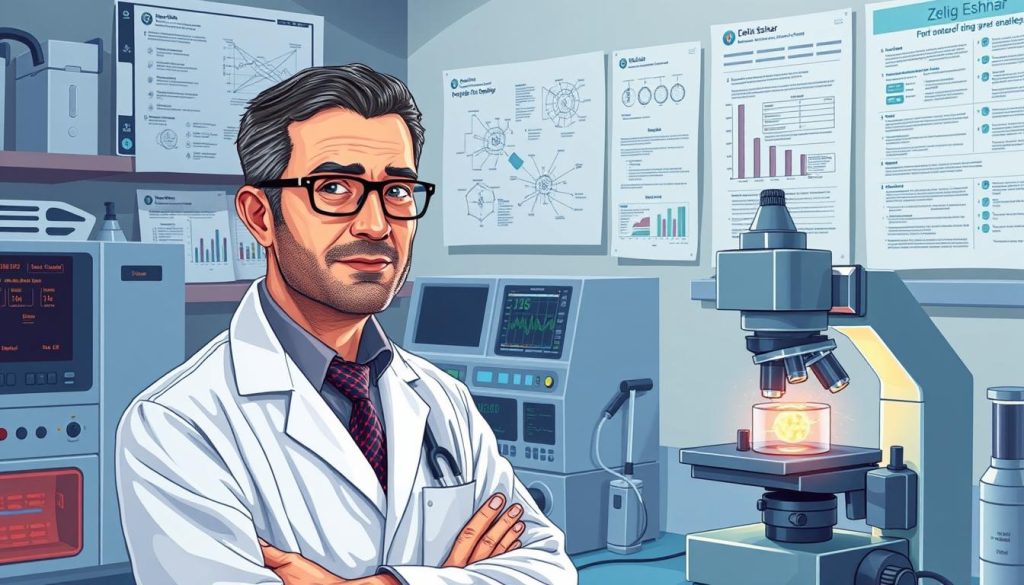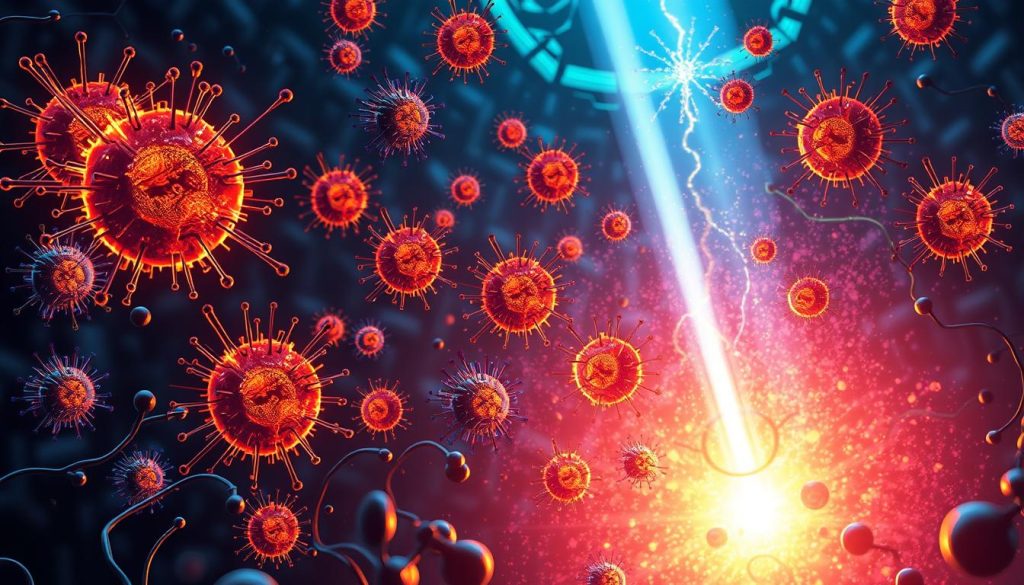The chimeric antigen receptor T cell therapy, or CAR T cell therapy, has changed cancer treatment. It uses a patient’s immune system to fight cancer. This gives new hope to those with hard-to-treat cancers. But who were the pioneers behind this discovery?
Creating CAR T cell therapy was a team effort over many years. Key researchers like Dr. Steven Rosenberg, Dr. Zelig Eshhar, Dr. Carl June, and Dr. Michel Sadelain were vital. Their hard work and dedication helped make CAR T cell therapies that save lives today.
In this article, we’ll explore CAR T cell therapy’s history. We’ll look at the work of these pioneers and the science behind it. From the start of adoptive cell transfer to the first clinical trials, we’ll follow CAR T cell therapy’s journey.
The Pioneering Work of Dr. Steven Rosenberg
Dr. Steven Rosenberg is a leading cancer researcher at the National Cancer Institute. He has been key in creating new ways to fight cancer. His work on adoptive cell transfer and tumor-infiltrating lymphocytes led to CAR T cell therapy.
In the 1980s, Dr. Rosenberg started looking into how the body’s immune system could fight cancer. He focused on a method called adoptive cell transfer. This involves taking immune cells from a patient, changing them to attack cancer, and then putting them back in the patient.
Early Research on Adoptive Cell Transfer
Dr. Rosenberg’s early work on adoptive cell transfer showed great promise. In 1988, he published a study. It showed that immune cells called lymphokine-activated killer (LAK) cells could be taken from patients, grown in the lab, and then used to kill cancer cells.
“The immune system has the power to find and kill cancer cells. Our goal is to use that power to make treatments that work for patients.” – Dr. Steven Rosenberg
Groundbreaking Discoveries in Tumor-Infiltrating Lymphocytes
In the early 1990s, Dr. Rosenberg made a major discovery. He found that a certain immune cell, called tumor-infiltrating lymphocytes (TILs), could be taken from tumors, grown in the lab, and then used to kill cancer cells.
This finding opened new doors for cancer treatment. It showed that TILs could find and kill cancer cells. Dr. Rosenberg’s work proved that genetically modified immune cells could be used to treat cancer.
Dr. Zelig Eshhar’s Contributions to CAR T Cell Development
Dr. Zelig Eshhar, an Israeli immunologist, was key in creating CAR T cell therapy. His research started a new era in cancer treatment. This therapy has changed how we fight cancer.

Eshhar combined T cells’ strength with antibodies’ precision. He engineered T cells to fight cancer cells better. This was a major breakthrough in cancer treatment.
The Concept of Chimeric Antigen Receptors
Eshhar’s work centered on chimeric antigen receptors. These receptors find and destroy cancer cells. They are made to recognize specific cancer cell markers.
His CAR design had three parts:
- An antibody part to find the cancer
- A part to keep the receptor on the T cell
- A part to activate the T cell when it finds cancer
First Successful CAR T Cell Experiments in Mice
In the early 1990s, Eshhar’s team showed CAR T cell therapy’s promise. They made CAR T cells to target 2,4,6-trinitrophenyl (TNP) in mice.
The results were amazing. The CAR T cells killed TNP tumor cells in mice. This was the first proof that CAR T cell therapy could work. It opened doors for more research and human treatments.
“The beauty of the T-body approach is that it is not restricted to a single type of cancer or a specific antigen. By choosing the appropriate antibody, T-bodies may be targeted to many types of cancer cells.”
– Dr. Zelig Eshhar
| Year | Milestone |
|---|---|
| 1989 | Eshhar publishes the concept of combining antibodies with T cells |
| 1993 | First successful CAR T cell experiments in mice targeting TNP antigen |
| 1998 | Eshhar’s team develops CAR T cells targeting the folate receptor |
Eshhar’s work on chimeric antigen receptors was groundbreaking. His success in mice paved the way for human treatments. His contributions are key to CAR T cell therapy’s development.
Dr. Carl June’s Breakthrough Clinical Trials
Dr. Carl June is a leader in car t cell therapy. In 2010, he started a trial at the University of Pennsylvania. The goal was to treat advanced chronic lymphocytic leukemia (CLL) with CAR T cells.
The results were amazing. Two out of three patients got complete remission.
Emily Whitehead, a young girl, was diagnosed with acute lymphoblastic leukemia (ALL). She tried all usual treatments but didn’t get better. Then, she got car t cell therapy under Dr. June’s care.
Her recovery was a big deal. It made people very interested in this new way to fight cancer.
“Our results serve as a proof of principle that we can genetically alter a patient’s own immune system to attack their cancer.”
– Dr. Carl June
Dr. June’s trials also helped patients with other blood cancers. These included non-Hodgkin lymphoma and multiple myeloma. The trials showed CAR T cells could lead to long-term remissions.
| Clinical Trial | Cancer Type | Response Rate |
|---|---|---|
| CLL | Chronic Lymphocytic Leukemia | 67% |
| ALL | Acute Lymphoblastic Leukemia | 83% |
| NHL | Non-Hodgkin Lymphoma | 71% |
The success of these trials led to the FDA approving Kymriah in 2017. Dr. June’s work has inspired many. It has given new hope to cancer patients.
Collaboration Between Eshhar and June
Dr. Zelig Eshhar and Dr. Carl June’s work led to CAR T cell therapy. They mixed their knowledge in immunology and gene therapy. This created a new way to fight cancer.

Dr. Eshhar started with chimeric antigen receptors. Dr. June showed how they could help leukemia patients. Their collaboration brought together their skills to move the field forward.
Combining Expertise to Advance CAR T Cell Therapy
Eshhar and June’s work together was a perfect match. Eshhar knew a lot about immunology and T cells. June was great at gene therapy and research.
They worked to make CAR T cells better. They added parts to help the cells work longer and stronger. This made the therapy safer and more effective.
The Pivotal Role of Dr. Bruce Levine
Dr. Bruce Levine was also key in CAR T cell therapy. He helped turn lab ideas into real treatments. His work in bruce levine car t cell therapy was vital.
Levine made it possible to make CAR T cells for many patients. His work helped bring the therapy to those who needed it most. He was a bridge between research and treatment.
| Collaborator | Key Contributions |
|---|---|
| Dr. Zelig Eshhar | Pioneered the concept of chimeric antigen receptors |
| Dr. Carl June | Conducted groundbreaking clinical trials with CAR T cells |
| Dr. Bruce Levine | Developed manufacturing processes for clinical-grade CAR T cells |
The work of Eshhar, June, and Levine shows how teamwork can change medicine. Their work has given new hope to cancer patients. It shows the power of working together in science.
The Impact of Dr. Michel Sadelain’s Research
Dr. Michel Sadelain is a top scientist at Memorial Sloan Kettering Cancer Center. He has greatly improved CAR T cell therapy. His work has focused on making this treatment better and safer.
Dr. Sadelain has found new ways to make CAR T cells work better. He has improved the parts of CAR T cells that help them find and kill cancer cells. This has made CAR T cells more effective and precise.
Refining CAR T Cell Design
Dr. Sadelain’s research has led to better CAR T cells. He created second-generation CARs with extra parts to help T cells work longer. These new CARs have shown great results in clinical trials, helping patients more.
Dr. Sadelain’s work has brought many improvements to CAR T cell design. Some of these include:
- Improving the scFv (single-chain variable fragment) for better antigen recognition
- Adding more co-stimulatory domains (like CD28, 4-1BB) to boost T cell function
- Creating new CAR designs, such as tandem CARs and switchable CARs
Enhancing CAR T Cell Efficacy and Safety
Dr. Sadelain has also worked on making CAR T cell therapy safer and more effective. He has found ways to reduce side effects like cytokine release syndrome (CRS) and neurotoxicity. This makes the treatment more comfortable for patients.
“Our goal is to create safer and more effective CAR T cells that can benefit a wider range of patients with different types of cancer.” – Dr. Michel Sadelain
Dr. Sadelain and his team have explored several ways to improve CAR T cell therapy. Some of these include:
| Approach | Mechanism | Benefit |
|---|---|---|
| Suicide genes | Enable selective elimination of CAR T cells | Mitigate CRS and neurotoxicity |
| Dual-antigen targeting | Require recognition of two antigens for activation | Reduce off-tumor toxicity |
| Inducible CARs | Allow controlled activation of CAR T cells | Improve safety and control over therapy |
Dr. Michel Sadelain’s research has been key in advancing CAR T cell therapy. His work has made this treatment more effective and safer. This has opened up new possibilities for treating different cancers.
Who Invented CAR T Cell Therapy? A Collaborative Effort
The creation of CAR T cell therapy was a team effort over many years. It involved many scientists working together. Dr. Steven Rosenberg, Dr. Zelig Eshhar, and Dr. Carl June were key players, but it was the team’s work that made it happen.

Each scientist added to the knowledge base, making the therapy better. Dr. Rosenberg started with early work on cell transfer and lymphocytes. Dr. Eshhar came up with the idea of chimeric antigen receptors. Dr. June then showed how it could treat blood cancers in clinical trials.
Dr. Eshhar and Dr. June worked together, combining their skills. This partnership was key to advancing the therapy. Dr. Bruce Levine and Dr. Michel Sadelain also played big roles in making CAR T cells safer and more effective.
“CAR T cell therapy is a testament to the power of scientific collaboration. It’s a shining example of how pooling our knowledge and resources can lead to truly life-changing innovations.”
This teamwork has made a huge difference. Now, CAR T cell therapy gives hope to those with blood cancers who’ve tried everything else. As research goes on, it could help more people in the future.
| Scientist | Key Contribution |
|---|---|
| Dr. Steven Rosenberg | Early research on adoptive cell transfer and tumor-infiltrating lymphocytes |
| Dr. Zelig Eshhar | Concept of chimeric antigen receptors |
| Dr. Carl June | Breakthrough clinical trials demonstrating CAR T cell therapy’s potentia |
| Dr. Bruce Levine | Optimization of CAR T cell production and manufacturing |
| Dr. Michel Sadelain | Refinement of CAR T cell design for enhanced efficacy and safety |
In conclusion, CAR T cell therapy wasn’t made by one person. It was a group effort by many dedicated researchers. Their hard work and teamwork have led to a groundbreaking cancer treatment that keeps getting better and offers hope to people all over the world.
The Role of Pharmaceutical Companies in CAR T Cell Commercialization
Pharmaceutical companies have been key in making CAR T cell therapy available to patients. They’ve helped solve problems like making the treatment, getting it approved, and getting it to patients. This has made a big difference in how we fight cancer.
Novartis and Kite Pharma are leaders in CAR T cell therapy. They’ve worked hard with scientists and universities to improve this technology. Their efforts have been critical in moving this treatment forward.
Novartis and Kymriah
Novartis is a Swiss company leading in CAR T cell therapy. In August 2017, the FDA approved Kymriah for kids and young adults with a certain type of leukemia. This was a big win, making Kymriah the first CAR T cell therapy approved by the FDA.
Kite Pharma and Yescarta
Kite Pharma, now part of Gilead Sciences, has also made big strides. In October 2017, the FDA approved Yescarta for adults with a certain type of blood cancer. Yescarta was the second CAR T cell therapy approved, giving more hope to patients.
The table below compares the key aspects of Kymriah and Yescarta:
| Product | Company | Indication | FDA Approval |
|---|---|---|---|
| Kymriah | Novartis | Pediatric and young adult relapsed or refractory B-cell ALL | August 2017 |
| Yescarta | Kite Pharma (Gilead Sciences) | Adult relapsed or refractory large B-cell lymphoma | October 2017 |
Companies like Novartis and Kite Pharma have been vital in making CAR T cell therapy available. They’ve worked hard to improve production, quality, and distribution. Their ongoing research will help make CAR T cell therapy even better for cancer patients.
FDA Approval of CAR T Cell Therapies
The U.S. Food and Drug Administration (FDA) has approved several CAR T cell therapies. This is a big step in the fight against cancer. In August 2017, the FDA approved Kymriah (tisagenlecleucel) for kids and young adults with B-cell acute lymphoblastic leukemia (ALL). This made Kymriah the first CAR T cell therapy approved by the FDA.

In October 2017, the FDA approved Yescarta (axicabtagene ciloleucel) for adults with certain large B-cell lymphoma. These approvals came after clinical trials showed great results. CAR T cell therapy had high success rates and long-lasting effects in patients who had tried other treatments.
The FDA checks CAR T cell therapies carefully. They look at safety and how well they work in clinical trials. Here’s a table with key info on the two approved CAR T cell therapies:
| Therapy | Manufacturer | Indication | Approval Date |
|---|---|---|---|
| Kymriah (tisagenlecleucel) | Novartis | Pediatric and young adult B-cell ALL | August 2017 |
| Yescarta (axicabtagene ciloleucel) | Kite Pharma (Gilead) | Adult large B-cell lymphoma | October 2017 |
The fda approval of car t cell therapy has given hope to patients with blood cancers. More trials and new therapies are coming. The FDA will keep checking these treatments to make sure they are safe and work well for cancer patients.
Current Applications of CAR T Cell Therapy
CAR T cell therapy has changed the game for some blood cancers. It gives hope to those who’ve tried everything else. It mainly helps with blood cancers like acute lymphoblastic leukemia (ALL), chronic lymphocytic leukemia (CLL), and certain lymphomas.
This therapy has shown amazing results in treating these cancers. Many patients have seen complete remission, even after failing other treatments. The FDA has approved several CAR T cell therapies for these blood cancers.
- Kymriah (tisagenlecleucel) for pediatric and young adult ALL and adult diffuse large B-cell lymphoma (DLBCL)
- Yescarta (axicabtagene ciloleucel) for adult DLBCL and follicular lymphoma
- Tecartus (brexucabtagene autoleucel) for adult mantle cell lymphoma and ALL
- Breyanzi (lisocabtagene maraleucel) for adult DLBCL
Treating Hematologic Malignancies
Why does CAR T cell therapy work so well for blood cancers? Blood cancers often have specific antigens, like CD19, that CAR T cells can target. Also, the immune system can more easily reach blood cancers, making CAR T cells more effective.
“CAR T cell therapy has transformed the treatment landscape for patients with relapsed or refractory blood cancers. It has provided a new lease on life for many patients who had run out of options.”
Expanding to Solid Tumors
But CAR T cell therapy faces a bigger challenge with solid tumors. Solid tumors have different problems, like varied antigen expression and tough tumor environments. It’s harder for CAR T cells to get to and attack these cancers.
Researchers are working hard to solve these problems. They’re looking into ways to make CAR T cell therapy work for solid tumors too. Some ideas include targeting specific tumor antigens and improving T cell movement into tumors.
| Strategy | Description |
|---|---|
| Targeting tumor-specific antigens | Identifying and targeting antigens that are exclusively or predominantly expressed on solid tumor cells |
| Enhancing T cell trafficking | Engineering CAR T cells to express chemokine receptors or homing molecules to improve their ability to infiltrate solid tumors |
| Overcoming immunosuppression | Combining CAR T cell therapy with checkpoint inhibitors or other immunomodulatory agents to counteract the immunosuppressive tumor microenvironment |
As research continues, CAR T cell therapy might help more cancer types, including solid tumors. Ongoing trials and studies are promising. They could make this therapy available to more patients, improving cancer treatment worldwide.
Challenges and Limitations of CAR T Cell Therapy
Even though CAR T cell therapy has shown great success in treating some blood cancers, there are many challenges. These challenges make it hard to use this therapy for more patients. It’s important to keep working on these issues to make the therapy better and more available.

Managing Cytokine Release Syndrome
One big problem with CAR T cell therapy is cytokine release syndrome (CRS). CRS happens when the CAR T cells release too many inflammatory cytokines. This can cause serious symptoms like fever, low blood pressure, and organ problems. To deal with this, scientists are looking into different ways to manage CRS, such as:
- Incorporating suicide genes into CAR constructs to enable controlled elimination of CAR T cells
- Using tocilizumab, an IL-6 receptor antagonist, to manage CRS symptoms
- Developing CAR T cells with lower affinity for target antigens to reduce excessive activation
Overcoming Antigen Escape and Tumor Heterogeneity
Another big challenge is dealing with cancer cells that change or lose the target antigen. Also, solid tumors are often different in how they express antigens. To tackle these issues, scientists are exploring:
- Dual-targeting CAR T cells that recognize multiple tumor-associated antigens
- Combination therapies that pair CAR T cells with checkpoint inhibitors or other immunotherapies
- Strategies to enhance CAR T cell persistence and prevent exhaustion
The table below summarizes the key challenges and possible solutions in CAR T cell therapy:
| Challenge | Potential Solutions |
|---|---|
| Cytokine Release Syndrome | Suicide genes, tocilizumab, lower affinity CARs |
| Antigen Escape | Dual-targeting CARs, combination therapies |
| Tumor Heterogeneity | Dual-targeting CARs, improving CAR T cell persistence |
As scientists keep working on these challenges, CAR T cell therapy could change how we treat cancer. With each new discovery, we get closer to a future where personalized treatments are common for many cancers.
Future Directions in CAR T Cell Research
Researchers are making big strides in CAR T cell therapy, aiming to make it even better. They’re working on creating CAR T cells that can target more than one cancer antigen at a time. This could make the treatment more effective and reduce side effects.
Another exciting area is finding new targets for CAR T cells. Most current therapies focus on CD19. But scientists are looking at other antigens, like BCMA for multiple myeloma and GD2 for neuroblastoma. This could help treat more types of cancer.
- BCMA (B-cell maturation antigen) for multiple myeloma
- GD2 for neuroblastoma and melanoma
- Mesothelin for mesothelioma and pancreatic cancer
- HER2 for breast and gastric cancers
Researchers are also trying to make CAR T cells work better in tough tumor environments. They’re adding molecules like cytokines to help CAR T cells fight cancer longer and more effectively. For example, CAR T cells with IL-12 have shown great promise in early studies.
The future of CAR T cell therapy includes using cells from healthy donors. This could make the treatment faster, cheaper, and available to more people. Companies like Allogene Therapeutics and CRISPR Therapeutics are leading this effort.
“The field of CAR T cell therapy is rapidly evolving, and we are only beginning to scratch the surface of its potential. With continued research and innovation, we can expect to see even more groundbreaking advancements in the coming years.” – Dr. Michel Sadelain, Memorial Sloan Kettering Cancer Center
As CAR T cell therapy advances, solving manufacturing, cost, and access issues is key. Researchers are working to make production faster and cheaper. With more research and teamwork, CAR T cell therapy could save many lives in the future.
The Potential of Allogeneic CAR T Cells
Allogeneic CAR T cells, also known as “off-the-shelf” CAR T cell therapy, are a big step forward in cancer treatment. They are made from healthy donors, not the patient’s own cells. This makes them different from traditional CAR T cell therapy.
Advantages of “Off-the-Shelf” CAR T Cell Therapy
One big plus of allogeneic CAR T cells is they’re ready to use right away. This means treatment can start sooner, without waiting for the patient’s cells to be prepared. This is a big help for people with fast-growing cancers.
Also, off-the-shelf CAR T cell therapy could be cheaper and more accessible. It can be made in big batches, helping more people get the treatment they need.
Companies Developing Allogeneic CAR T Cell Therapies
Many biotech and pharma companies are working on allogeneic CAR T cell therapies. Some leading companies include:
| Company | Product | Target |
|---|---|---|
| Allogene Therapeutics | ALLO-501 | CD19 |
| Cellectis | UCART19 | CD19 |
| Precision BioSciences | PBCAR0191 | CD19 |
| CRISPR Therapeutics | CTX110 | CD19 |
These companies are running clinical trials to check if their therapies work. They’re testing these treatments in different types of cancers. If these trials succeed, it could change how we treat cancer, making treatments faster and more available.
“The development of allogeneic CAR T cells represents a significant step forward in making this revolutionary treatment more accessible to patients who need it most.” – Dr. David Chang, CEO of Allogene Therapeutics
As research keeps moving forward, allogeneic CAR T cells could really change cancer care. Scientists, doctors, and companies are all working together. This could bring hope to many people fighting cancer around the world.
Combining CAR T Cells with Other Immunotherapies
Researchers are looking into combining CAR T cell therapy with other treatments. They want to make treatments work better together. This way, they hope to improve how well patients do.
One idea is to mix CAR T cells with immune checkpoint inhibitors. These inhibitors help T cells fight cancer better. By adding them to CAR T cells, scientists aim to make the treatment stronger.
Another idea is to pair CAR T cells with cancer vaccines. Vaccines help the body recognize and attack cancer. Together, CAR T cells and vaccines could create a stronger defense against cancer.
Researchers also think about mixing CAR T cells with oncolytic viruses. These viruses target and kill cancer cells but not healthy ones. They believe this mix could make tumors more vulnerable to CAR T cells.
| Immunotherapy | Mechanism of Action | Potential Synergy with CAR T Cells |
|---|---|---|
| Immune Checkpoint Inhibitors | Release brakes on immune system | Enhance persistence and functionality of CAR T cells |
| Cancer Vaccines | Stimulate immune response against tumor antigens | Generate robust and diverse immune response |
| Oncolytic Viruses | Selectively infect and kill cancer cells | Prime tumor microenvironment for CAR T cell activity |
The goal is to fight cancer in many ways at once. By using different treatments together, scientists hope to beat cancer’s tricks. This is a new and exciting area of research for cancer treatment.
The Lasting Impact of CAR T Cell Therapy Pioneers
Drs. Steven Rosenberg, Zelig Eshhar, Carl June, and Michel Sadelain have made a huge impact on cancer treatment. Their research and teamwork led to CAR T cell therapy. This treatment has changed many lives, showing the power of their work.
Many patients have found new hope with CAR T cell therapy. It gave them a second chance when all else failed. Their stories inspire others to keep working on cancer treatments.
As CAR T cell therapy grows, the work of these pioneers will always be remembered. They’ve helped create better treatments for many cancers. Their legacy will keep giving hope to patients and their families for years to come.
FAQ
Q: Who are the key scientists involved in the development of CAR T cell therapy?
A: Many scientists worked together to create CAR T cell therapy. Dr. Steven Rosenberg, Dr. Zelig Eshhar, Dr. Carl June, Dr. Michel Sadelain, and Dr. Bruce Levine were key. They made important discoveries that led to this new cancer treatment.
Q: What were Dr. Steven Rosenberg’s contributions to CAR T cell therapy?
A: Dr. Steven Rosenberg did early work on using the immune system to fight cancer. His research showed that the immune system could be used to attack tumors. This was a big step towards CAR T cell therapy.
Q: How did Dr. Zelig Eshhar contribute to the development of CAR T cells?
A: Dr. Zelig Eshhar came up with the idea of chimeric antigen receptors (CARs). He did the first successful CAR T cell experiments in mice. His work showed that T cells could be engineered to target cancer cells.
Q: What was the significance of Dr. Carl June’s clinical trials in CAR T cell therapy?
A: Dr. Carl June led clinical trials that showed CAR T cell therapy works well in humans. His trials proved the therapy’s effectiveness in treating blood cancers. This news excited the medical community.
Q: How did the collaboration between Dr. Eshhar and Dr. June advance CAR T cell therapy?
A: Dr. Zelig Eshhar and Dr. Carl June teamed up, combining their knowledge. Dr. Bruce Levine also played a big role. Together, they moved CAR T cell therapy from the lab to the clinic.
Q: What impact did Dr. Michel Sadelain’s research have on CAR T cell therapy?
A: Dr. Michel Sadelain worked on making CAR T cells better and safer. He helped make the therapy ready for use in patients. His research focused on reducing side effects and keeping CAR T cells in the body longer.
Q: Which pharmaceutical companies played a role in the commercialization of CAR T cell therapies?
A: Novartis and Kite Pharma (now part of Gilead Sciences) were key in making CAR T cell therapies available. Novartis developed Kymriah, and Kite Pharma developed Yescarta. Both got FDA approval for treating certain blood cancers.
Q: What are the current applications of CAR T cell therapy?
A: CAR T cell therapy is effective against blood cancers like leukemia and lymphoma. Researchers are working to use it for solid tumors too. But, they face challenges like tumor heterogeneity and antigen escape.
Q: What are some of the challenges and limitations of CAR T cell therapy?
A: CAR T cell therapy has challenges, like cytokine release syndrome (CRS). This is a serious side effect. The therapy also struggles with antigen escape and tumor heterogeneity, which can limit its success.
Q: What does the future hold for CAR T cell therapy research?
A: The future of CAR T cell research looks bright. Scientists are trying to make the therapy better and safer. They’re exploring new ways, like using allogeneic CAR T cells and combining them with other treatments.


















